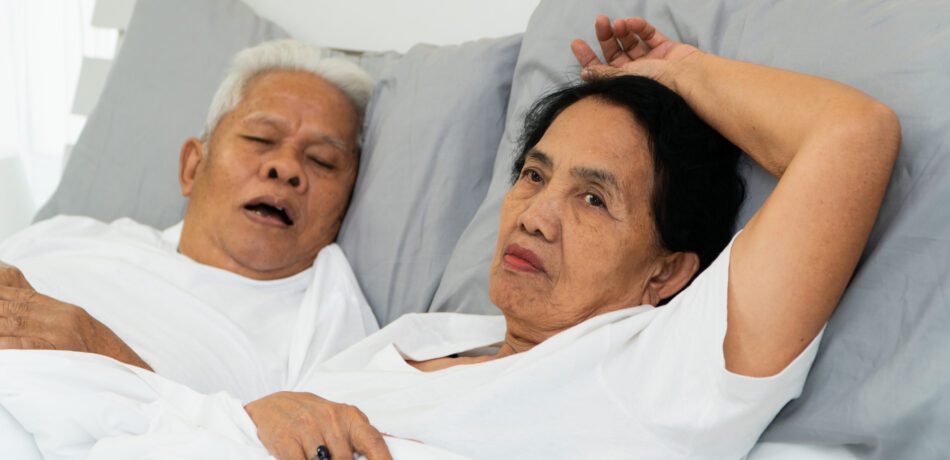Do you snore? Millions of Americans snore every night. This habit might seem like nothing more than a nuisance for your bed partner. But in some cases, snoring is a sign of something more sinister — potentially leading to health issues that can have serious ramifications.
40-70% of adults have chronic sleep issues. Is snoring the culprit of yours? Here’s what to know about snoring and when to get a medical opinion.
What is Snoring?
Let’s start with the basics. Snoring is noisy breathing while you sleep, and it’s caused by the vibration of tissues near your airway in the back of your throat. When you sleep, your muscles loosen, and your airway becomes narrower. The tissues then flutter and make noise as you breathe.
While anybody can snore (including children), people who are overweight and men are more likely to snore while they sleep. Snoring also generally gets worse with age.
Causes of Snoring
Why exactly do we snore? The answer is different for everybody. Your snoring might be benign, meaning it’s a harmless quirk that isn’t hurting your body. Or your snoring could be a symptom of an underlying health concern. Everyone’s body is different. Risk factors that make you more likely to snore include:
- Obesity
- Consuming alcohol
- Using sedatives
- Smoking
- Chronic nasal congestion, or congestion from a cold
- Swollen adenoids and tonsils
- Poor muscle tone
- Large tonsils, tongue, or soft palate
- Pregnancy
- Small jaw
- Deviated septum or nasal polyps
- Sleeping on your back
- Sleep deprivation
These factors can all contribute to snoring (in many cases, by further relaxing your throat muscles, which causes snoring).
Guaranteed Acceptance Life Insurance
Coverage options starting at $9.95 a month!
Guaranteed acceptance life insurance without medical exams, health questions, or rate increases.
Home Remedies for Snoring
If you feel that your snoring is affecting your sleep or the sleep of your partner, here are a few suggestions to try:
- Sleep on your side (not your back)
- Practice good sleep hygiene, including following a sleep schedule
- Raise the head of your bed a few inches
- Do a nasal saline rinse or spray
- Use nasal strips that stick to the bridge of your nose
- Don’t smoke, and don’t drink alcohol before bed
When to See a Doctor
It’s a good idea to go further than home remedies and see a doctor if, in addition to snoring, you’re experiencing:
- Daytime drowsiness and exhaustion
- Trouble focusing and memory problems
- Morning headaches
- Insomnia
- Waking up frequently throughout the night
- Gasping or choking during sleep
- High blood pressure
- Weight gain
You can start by visiting your primary care provider. He or she might refer you to an ENT (ear, nose, and throat doctor) or a sleep specialist. A sleep doctor will likely have you do a sleep study, which monitors your body while you sleep and can diagnose conditions such as sleep apnea.
What is Sleep Apnea?
Sleep apnea is a sleep disorder that causes you to stop breathing during sleep. People with sleep apnea repeatedly stop and start breathing as they sleep. This happens because your throat muscles relax so much they collapse, preventing you from breathing fully and normally.
The most common type of sleep apnea is obstructive sleep apnea, although a second type that is caused by your brain is known as central sleep apnea. Complex sleep apnea combines both types.
Many people who have sleep apnea don’t realize it and think it’s just insomnia. It’s important to seek a proper diagnosis because this condition can cause more serious complications.
Sleep Apnea Complications
When left untreated, obstructive sleep apnea can lead to additional health conditions and complications that can become serious. These include:
- Daytime drowsiness
- Cardiovascular issues (heart attack, stroke, and irregular heartbeats)
- High blood pressure
- Type 2 diabetes
- Complications with medicines and surgery
- Liver problems
- Metabolic syndrome
- Depression
Treating Sleep Apnea
If lifestyle changes don’t help your sleep apnea, your doctor will likely recommend either an oral appliance or a CPAP (continuous positive airway pressure). An oral appliance is a plastic device that goes in your mouth while you sleep, while a CPAP is a machine that blows air through a mask attached to your nose. Both treatments help keep your airway open so you continue breathing while asleep.
If less invasive treatments don’t work, your doctor may recommend surgery. For example, you may need your tonsils removed, or to have your deviated septum fixed. Your doctor also might remove excess tissue in the back of your mouth and throat.
Take Control of Your Sleep
If your snoring is paired with other common symptoms of sleep apnea, see your doctor. They can help you figure out if sleep apnea is causing your snoring and the best course of treatment that can improve your sleep.
Want more? Check out 5 Free and Easy Ways to Work Exercise Into Your Day
Colonial Penn is here for you!
Colonial Penn has specialized in making life insurance simple and accessible by offering it directly to consumers since 1957. Click here to learn more.





